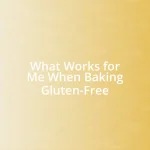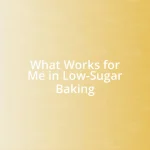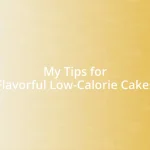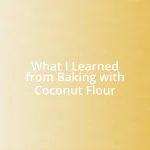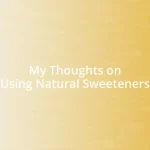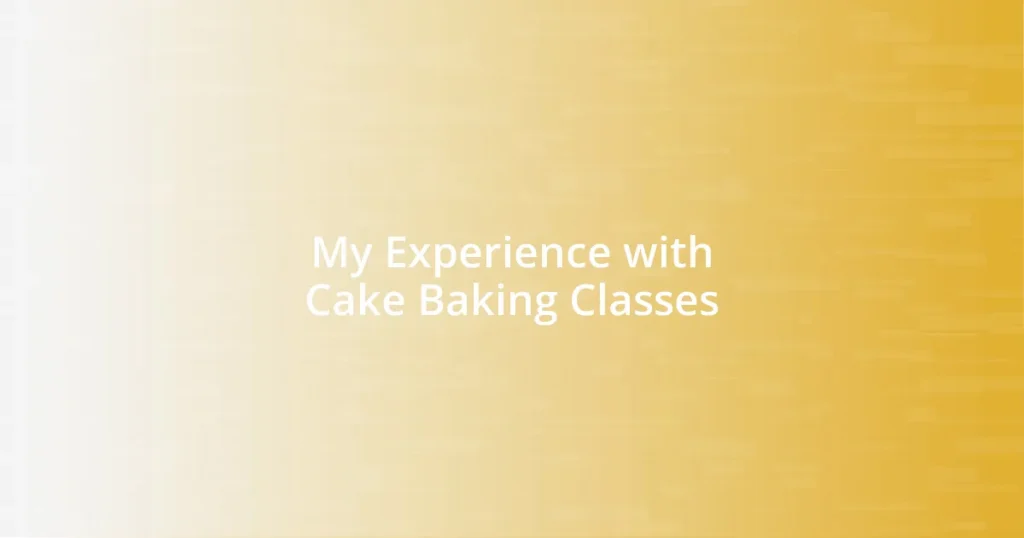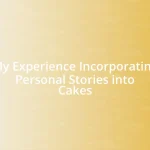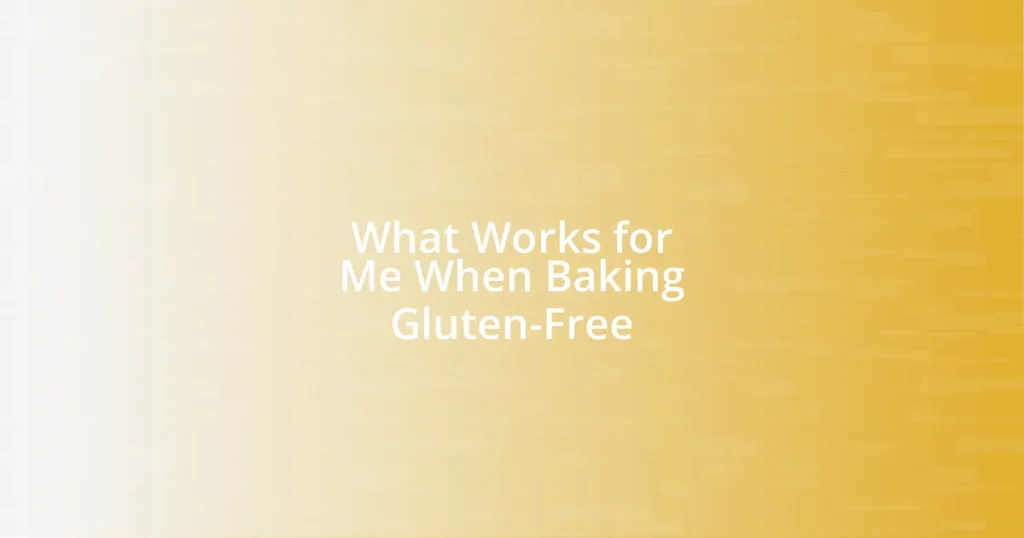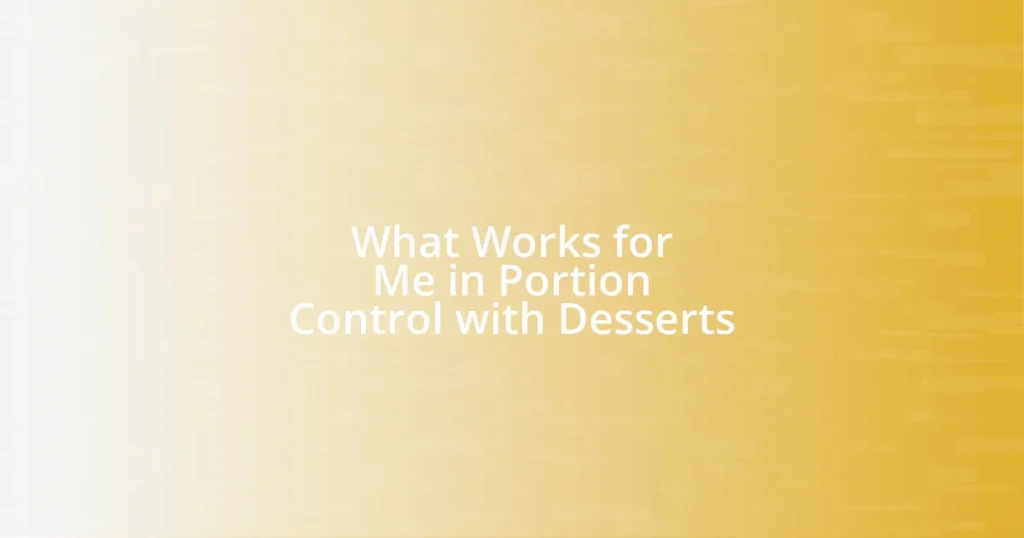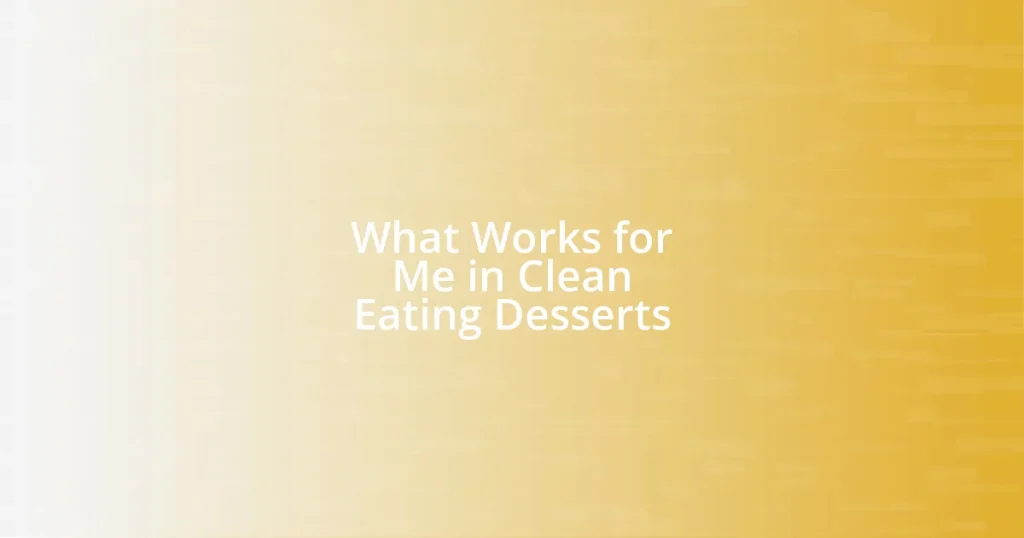Key takeaways:
- Cake baking classes offer a nurturing environment that fosters community and emotional connections through shared experiences.
- Key skills learned include ingredient knowledge, baking techniques, decorating skills, problem solving, and time management.
- Essential tools for successful baking include a stand mixer, measuring cups/spoons, and quality cake pans to ensure consistent results.
- Patience, preparation (mise en place), and trusting instincts are crucial for baking success and creativity.

What to Expect from Classes
When you step into a cake baking class, prepare for a delightful mix of hands-on learning and creative exploration. I remember the first class I took; the aroma of vanilla and butter filled the air, instantly putting me at ease. It made me wonder—how could such simple ingredients transform into something exquisite?
You can expect a nurturing environment where everyone is encouraged to share their experiences. One time, a fellow student shared a family recipe that sparked a lively discussion about the emotional connections we all have with baking. It’s moments like these that create a sense of community among participants, reminding us that baking is more than just a skill; it’s a way to connect with others and share memories.
As the instructor guides you through techniques like frosting or layering, you’ll gain confidence in your abilities. I vividly recall mastering the perfect ganache and feeling like a true chocolatier! Isn’t it exhilarating to see your hard work translate into a beautifully crafted cake? The satisfaction of creation makes every moment spent in class worthwhile, and you’ll leave with not just skills, but a deep appreciation for the art of baking.

Key Skills Learned in Class
In cake baking classes, I quickly discovered that it’s not just about following recipes; it’s about mastering key techniques that can elevate your baking game. One of my biggest takeaways was learning the science behind each ingredient—like how different types of flour can affect cake texture. I had this eye-opening moment when my instructor demonstrated how incorporating air into butter during creaming makes a sponge cake light and fluffy. It was fascinating to witness the transformation firsthand.
Here’s a rundown of essential skills learned in class:
- Ingredient Knowledge: Understanding how different ingredients interact to influence flavor and texture.
- Baking Techniques: Mastering skills like whisking, folding, and creaming that are crucial for a successful bake.
- Decorating Skills: Learning how to frost and decorate cakes beautifully, turning every cake into a work of art.
- Problem Solving: Developing the ability to troubleshoot issues, such as figuring out why a cake didn’t rise as expected.
- Time Management: Gaining experience in planning and executing steps efficiently to deliver a cake on time.
Each class felt like stepping into a treasure chest of culinary knowledge, and I left buzzing with excitement to try new techniques at home!

Essential Tools for Cake Baking
When it comes to cake baking, having the right tools significantly impacts the experience and outcome. Personally, I’ve learned the hard way just how essential certain items are. For instance, a good quality stand mixer can be a game changer. I recall struggling with hand mixing during my early classes—my arms were sore by the end of each session! Once I upgraded to a stand mixer, my batter came together effortlessly, allowing me to focus on technique rather than sheer strength.
Measuring cups and spoons are another must-have. I used to estimate measurements, thinking it wouldn’t make much difference, but oh, was I wrong! Precise measurements help achieve consistent results, making a world of difference in texture and flavor. The time I accidentally used a tablespoon instead of a teaspoon for baking powder taught me just how critical accuracy is. Now, I can’t stress enough how invaluable those simple tools are when creating a perfectly balanced cake.
Don’t overlook the importance of quality bakeware, like a sturdy cake pan. Investing in non-stick pans has made a remarkable difference in how easily I can release my cakes without the fear of crumbling. I remember a moment of sheer panic when I flipped a cake out of my old pan, only to find half of it still stuck! Since then, the right tools have turned baking from a stressful task into a joyful endeavor, allowing me to focus on the creativity of decorating instead of worrying about baking mishaps.
| Tool | Importance |
|---|---|
| Stand Mixer | Eases mixing and ensures thorough batter consistency. |
| Measuring Cups/Spoons | Provides accurate measurements for consistent baking results. |
| Quality Cake Pans | Ensures even baking and easy release of the cake. |

Tips for Success in Baking
When it comes to baking, I’ve found that patience is key. In one of my earlier classes, I was so excited to see my cake rise that I opened the oven door far too soon—big mistake! The result was a sunken disaster. This taught me that every step in the baking process deserves attention. I now wait at least until the minimum baking time to avoid that gut-wrenching disappointment.
Another tip I swear by is to mise en place, which means having all your ingredients measured and prepared before you start. It’s a French culinary term that changed my baking game completely. There’s a particular thrill in having everything in order; it feels like I’m setting myself up for success. I remember the chaos of fumbling for flour while trying to whisk, and let me tell you, that’s a recipe for stress. So, take the time to prep—it really makes a difference!
Finally, trust your instincts. I’ve had moments where I’ve felt compelled to follow a recipe to the letter, but listening to my intuition often leads to surprising delights. For example, I added a hint of orange zest to a standard vanilla cake once, and wow, did that elevate the flavor! It’s those personal touches that make baking truly enjoyable and reflective of your culinary identity. Wouldn’t you agree that a little creativity can transform a simple recipe into something extraordinary?

My Favorite Recipes from Class
One of my all-time favorite recipes from class has to be the chocolate ganache cake. The richness of the dark chocolate paired with a silky ganache is pure heaven! I remember the first time I made it; the aroma filled the room, and the anticipation was almost unbearable. It was a great reminder of how the sensory aspects of baking can elevate the experience—who doesn’t love the smell of freshly baked goods wafting through the air?
Then there was the lemon drizzle cake, which became another beloved recipe for me. The bright, zesty flavor is a fantastic way to chase away any gloomy day. I recall making it for a family gathering, and the wide smiles on everyone’s faces as they took their first bite were priceless. It sparked conversations about summer picnics and sunshine, making it clear that food has the power to create memories and connections.
Lastly, I can’t forget about the classic carrot cake with cream cheese frosting. The combination of spices and the creaminess of the frosting creates a comforting balance that’s hard to resist. I had a bit of a mishap with the frosting during class—it was too runny, and I panicked! But once the instructor shared her tips on achieving the perfect consistency, it all came together beautifully. This taught me that even when things go awry in the kitchen, you can turn it into a learning experience. What are your favorite recipes that bring back such fond memories?
